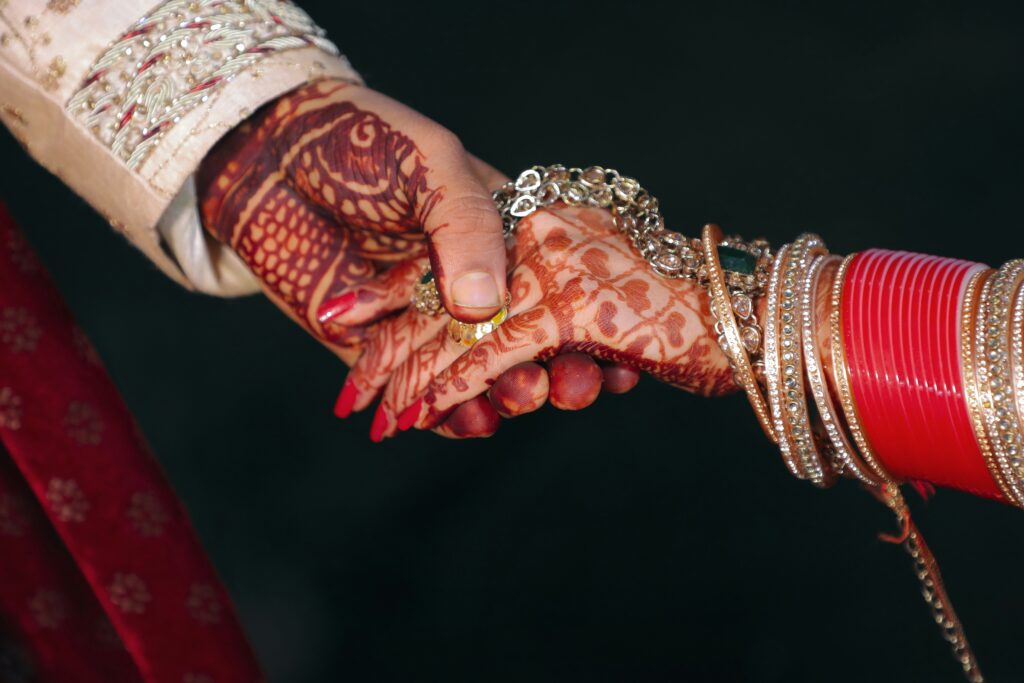Love Marriage vs Arranged Marriage: A Comparison
Love Marriage
When it comes to love marriage, the primary factor that sets it apart is the presence of love and mutual attraction between the individuals involved. Couples in love marriages have the freedom to choose their life partner based on their preferences and compatibility. They can spend time together, get to know each other, and build a strong foundation of love and understanding before committing to marriage.
Love marriages represent modernity and individualism. They show how society’s views are changing. People now prioritize personal happiness and fulfillment in relationships. In these marriages, couples openly express their love without fearing society’s judgment. This openness fosters deeper emotional bonds and satisfaction in the relationship.

Arranged Marriage
Arranged marriages also have benefits. They’re not just about two people but two families coming together. Families play a big role in arranging marriages, considering things like social status and compatibility. This support from families increases the likelihood of long-term success in the marriage.
Arranged marriages help preserve cultural traditions and social harmony. Families take the lead in finding a suitable match, offering security and stability. This eases the pressure of finding a partner, especially for those with limited social circles or uncertain preferences.
Factors to Consider
The success of any marriage, be it love or arranged, hinges on commitment, understanding, and effort from both partners. Love marriages begin with love and attraction, but arranged marriages can develop into profound relationships over time.
Ultimately, the decision between a love or arranged marriage is deeply personal and influenced by factors like preferences, culture, and societal norms. What truly counts is finding a life partner who brings love, happiness, and fulfillment, regardless of the type of marriage.
Disadvantages of Arranged Marriage
1. Limited Individual Autonomy: Arranged marriages can limit individual autonomy in making important life decisions. Families often influence various aspects like living arrangements, child-rearing, or career paths. This lack of autonomy can cause frustration and resentment among the partners.
2. Cultural and Religious Differences: While shared values and beliefs can be an advantage in arranged marriages, they can also lead to challenges if the couple comes from different cultural or religious backgrounds. These differences can create conflicts in terms of traditions, customs, and expectations, which may require significant compromise and understanding from both partners.
3. Lack of Emotional Connection: Arranged marriages sometimes lack the initial spark and emotional connection found in love marriages. Without this bond, couples might find it challenging to build a deep and fulfilling relationship, impacting their overall happiness and satisfaction.
4. Pressure to Maintain the Marriage: Arranged marriages can bring immense pressure to maintain the relationship, even if it’s not working or has compatibility issues. This pressure, from families, communities, or societal expectations, can compel individuals to stay in unhappy or unhealthy relationships.
5. Limited Exposure to Other Options: Arranged marriages often restrict individuals’ exposure to potential partners beyond their immediate social circle. This limitation may lead to missed opportunities to explore different relationships and discover someone who might be a better match in terms of compatibility, shared interests, or personal growth.
Disadvantages of Love Marriage
1. Cultural and Religious Differences: Love marriages may unite individuals from diverse cultural or religious backgrounds, enriching the relationship with diversity. However, this can also present challenges, such as cultural clashes or conflicting beliefs. The couple must find ways to reconcile their differences and foster a harmonious environment for their marriage.
2. Financial Considerations: Love marriages typically require financial independence from the couple, as they must support themselves. Unlike in arranged marriages, where families often share financial responsibilities, love marriages may necessitate the couple to establish their own financial stability, placing a heavier burden on them.
3. Social Stigma: In certain societies, love marriages may be met with skepticism or disapproval. The couple may encounter judgment or criticism from their community, adding extra pressure and stress to their relationship.
4. Lack of Long-Term Planning: Love marriages are often fueled by intense emotions of love and passion, sometimes overshadowing practical considerations. Couples may neglect vital aspects like financial planning, career goals, or family planning, leading to potential challenges in the future.
5. Higher Divorce Rates: Research indicates that love marriages often experience higher divorce rates than arranged marriages. This could be because love marriages rely on personal choice and emotions, which may change over time. Additionally, a lack of strong support systems and unrealistic expectations can contribute to these higher divorce rates in love marriages.
Learn about the must-have guide for women the world over, “The Beautiful Lessons from the Ugly Woman” by JosephCollins Study ways to become the driving force behind your guy’s success. Joseph dispels the misconception of “Ugly Women” and reveals the way true beauty goes beyond physical image. This book will help you build stronger, caring marriages and lift up your soulmate’s success. Begin your journey with “The Beautiful Lessons from the Ugly Woman.” it’s on theamazon website https://amzn.to/3VitpIu